Greatest voices in Hearts' history
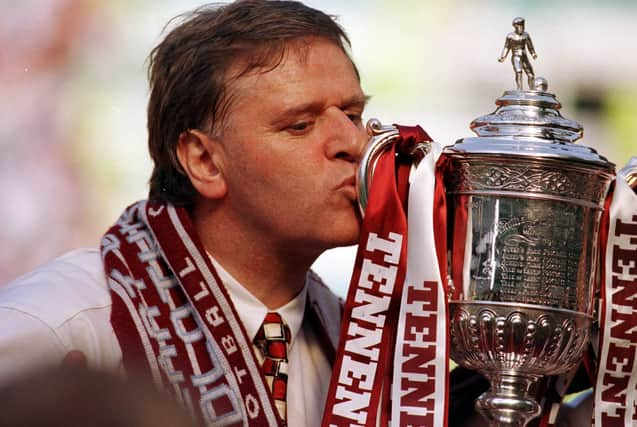

OVER the course of Heart of Midlothian Football Club’s long and distinguished history, there have been countless great voices.
But how many of them had such an impact that years, even decades, later, echoes of their voices can still be heard?
Advertisement
Hide AdAdvertisement
Hide AdWe asked official club historian, David Speed, to tell the story of five of Tynecastle’s most valuable voices and try and determine what it was exactly that made them so great for the Edinburgh Jam Tarts
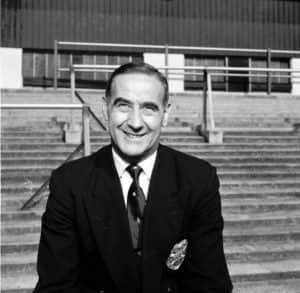

Tommy WalkerAs manager, Tommy Walker was the architect of Hearts’ greatest teams, those that won seven domestic honours during the fifties and early sixties, and played in European competition for the first time. This made up for the lack of club success during his own splendid playing career which saw Tommy score 224 goals in 408 competitive games for Hearts. He was born at Livingston Station in 1915 and was a Schoolboy Internationalist prior to joining Hearts’ ground staff in 1932 after a spell with Linlithgow Rose. Hearts fans then witnessed passing, dribbling and shooting skills which would make Tommy Walker Britain’s most admired playmaker for more than a decade.
Portrait of Hearts FC manager Tommy Walker in August 1964
In 1934, at the age of only nineteen, Tommy won the first of twenty Full International caps and during his career he also earned five League International and eleven Wartime honours. Tommy also appeared in ten unofficial Internationals.
English clubs often tried to tempt him away from Edinburgh, but he stayed to help Hearts to second place in the League in 1937-38 and to runners-up position in the East & North Division in 1939-40. His craft also assisted Hearts to the Wartime Cup Final in 1941. Tommy enjoyed a successful testimonial match against Derby County in 1938, but at the peak of his career, the Second World War took him overseas with the Royal Signal Corps. Tommy played as a guest for Bradford Park Avenue and Chelsea, and then in September 1946, the London club paid £6,000 for his transfer.
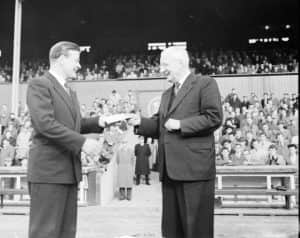

The gentleman footballer returned to Hearts in December 1948 as assistant manager to David McLean and Tommy took full control in September 1951 on the death of the Hearts manager. Tommy led the club through its finest era in record breaking style and his lifetime of service was recognised with the award of an OBE in 1960. Tommy resigned in 1966 and worked for Dunfermline Athletic and Raith Rovers, before becoming a director of Heart of Midlothian from 1974 to 1980. He was elected to both the Hearts and Scotland Halls of Fame and his contribution to Heart of Midlothian remains unsurpassed.
Willie BauldThe one and only “King of Hearts”, Willie Bauld was idolised, not only because he scored 355 goals in 510 appearances, but because his football brain and unselfish ability created many more for his colleagues. Everything Willie did on the field had class and elegance, and even at 5’8”, he possessed unrivalled heading ability.
Born in January 1927 in the Edinburgh mining community of Newcraighall, Willie played for the Boys Brigade, Edinburgh Waverley and Musselburgh Union, being provisionally signed from the latter club in 1945. The brickmakers’ apprentice was farmed out to Newtongrange Star and then loaned to Edinburgh City before being recalled in 1948. On 9 October that year, Willie scored a hat-trick against East Fife on his debut in a national competition and he hit another treble the following week. He was an instant success and the man to spearhead the “Terrible Trio”, the finest attacking partnership in the club’s history.
Willie Bauld receives his testimonial match cheque from Mr W Strachan at Tynecastle in 1962
Advertisement
Hide AdAdvertisement
Hide Ad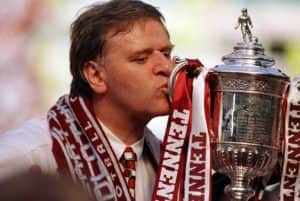

Due to injuries, the King played only three times for Scotland, but he did make thirteen appearances for the Scottish League. Willie also led Hearts to a decade of success, hitting a hat-trick in the League Cup Final against Motherwell in October 1954, bringing the club its first major honour in forty eight years. He also scored two goals in the winning League Cup Final team in October 1958 and led the attack when the Scottish Cup was won in 1956. Willie was a member of the Championship-winning squads in 1957-58 and 1959-60, and in addition, the King was involved in the club’s initial adventures in Europe.
Willie Bauld received a Testimonial against Sheffield United in 1962, but tragically, in March 1977, he died a very young man. Willie Bauld was elected to both the Hearts and Scotland Halls of Fame, but he should have been a Freeman of Edinburgh.
Jim Jefferies
Jim Jefferies is a Hearts legend, not only because his team brought success back to Tynecastle after a period of nearly 36 years, but because he was immensely proud to captain the side during an expansive career in maroon.
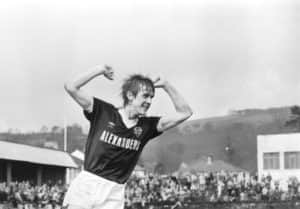

Born in Musselburgh in 1950, he played for Prestonpans YMCA and Gorgie Hearts, before joining Hearts in October 1967. The forceful defender was then farmed out to Haddington Athletic and Gala Fairydean, returning in June 1969. Jim made his competitive debut in March 1972 and soon became a permanent fixture in the team at full-back; centre-half; or as a midfield ball winner.
Jim Jefferies kisses the Scottish Cup after his side had overcome Rangers 2-1 at Celtic Park in May 1998. Pic TSPL
He was a stalwart in Hearts’ rearguard for many years and as captain, Jim led the team to the First Division Championship in 1980. He also helped Hearts to promotion in 1978 and in addition, Jim appeared in the Texaco Cup Final in 1971 and the Scottish Cup Final in 1976. The tough stopper subsequently played in the European Cup Winners Cup and if everyone had given as much as Jim Jefferies, Hearts would have avoided some embarrassing seasons in the First Division.
In November 1981, after scoring six goals in 349 appearances (309 competitive), Jim moved to Berwick Rangers, before managing Lauder United; Hawick Royal Albert; and Gala Fairydean. He returned to Berwick Rangers as manager and where he formed a long-standing and partnership with his assistant, Billy Brown. Jim then had a very successful spell at Falkirk before being appointed manager of Hearts in July 1995. He totally reshaped the squad which then reached the Scottish Cup Final in May 1996 and then the League Cup Final in November 1996. In addition, Hearts was third in the Premier Division in 1997-98; back in Europe on a regular basis; and once again producing International players, many through its own ranks. Then in May 1998, the supporters wildly celebrated the famous success of his team in the Scottish Cup Final against Rangers.
Although Hearts was third in the League in 1999-2000, Jim was lured to the English Premiership with Bradford City and he subsequently transformed Kilmarnock into one of Scotland’s strongest clubs.
Advertisement
Hide AdAdvertisement
Hide AdJim returned to Hearts in January 2010 and the following season the team finished a creditable third in the Premier Division. In August 2011, Jim left his favourite club and rounded off his managerial career with a spell at Dunfermline Athletic. Jim Jefferies has been a Hearts man all his life and that will never change. Accordingly, he was a very popular inductee to the Heart of Midlothian Hall of Fame.
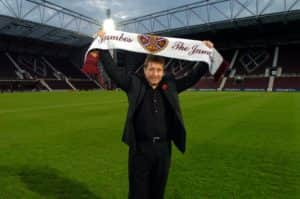

Gary Mackay
Born in Edinburgh in 1964, Gary Mackay is very much a local hero, being a former Tynecastle High School boy who went on to give Hearts over sixteen years of dedicated playing service. In addition, for many more years, he was a splendid ambassador for the club.
Hearts' Gary Mackay celebrates after scoring a goal in the Dumbarton v Hearts football match at Boghead, May 1983.
After signing from the very successful Salvesen Boys Club in June 1980, he smashed all the appearance records, with 737 games for the “Maroons”, including a record 515 League matches. Gary also scored a very creditable 88 goals, but his main asset was his midfield graft and skills, which brought out the best in his colleagues. He helped Scotland to win the European Youth Championship in 1982 and Gary was a key man when Hearts was promoted in 1982-83. He then assisted the team to achieve runners-up position in the Premier Division on three occasions (1985-86; 1987-88; and 1991-92) and Gary played in the Scottish Cup Finals of 1986 and 1996. In addition, the midfielder appeared in the League Cup Final in season 1996-97 when he was captain.
At his peak, Gary earned four Full International caps and he played a remarkable 21 European games for Hearts. When Gary Mackay kissed the badge he really meant it, and he richly deserved his Testimonial Match against Everton in May 1991. Gary joined Airdrieonians in March 1997 and later became manager of the Lanarkshire club. He became a players’ agent and media pundit, while supporting all Hearts commercial efforts. He remains the ideal man to express the views of the ordinary supporter.
John RobertsonBorn in Edinburgh in 1964, John Robertson is arguably the greatest goal scorer in Hearts’ history, having broken a number of established records after he was brought to Tynecastle from Edina Hibs Boys club in January 1981.
The former Schoolboy Internationalist made his debut in February 1982 and after he started scoring, John never stopped, eventually hitting 310 goals in 720 matches for the club. This might have been more, but John went to Newcastle United in April 1988. However, he suffered injury problems and was delighted to return to Hearts in December 1988 for a fee of £750,000.
John played sixteen times for Scotland and the International striker was top scorer in the Premier League in 1989-90. Three times, John assisted Hearts to runners-up position (1985-86; 1987-88; and 1991-92) and the club’s ace striker also played in the Scottish Cup Finals in 1986 and 1996, and the League Cup Final in 1996-97. John finally earned a winners’ medal when he was on the bench in Hearts’ victory over Rangers in the 1998 Scottish Cup Final, although sadly, he was not called into action.
Advertisement
Hide AdAdvertisement
Hide AdJohn Robertson is installed as Hearts boss in 2004. Pic: Rob McDougall
Over his fine career, John hit a club record of 214 League goals and he is Hearts’ top scorer in Europe with seven strikes. In addition, John hit 27 goals against Hibernian which is unsurpassed in the history of Edinburgh football. With the deadly striker on the field, Hearts always had a chance of victory.
John went to Livingston in August 1998 and made a huge contribution both in playing and coaching. He then had a highly successful period as manager of Inverness Caledonian Thistle, before taking on the huge challenge of managing Hearts from November 2004 until May 2005. John then managed Ross County, Livingston, Derry City and East Fife.
In 2013, with Hearts in administration, John Robertson returned to Edinburgh to support Gary Locke, giving his coaching skills free of charge, and as he has enhanced the image of the club over many years, he is currently a key member of the commercial team. John is, of course, a member of Hearts’ Hall of Fame.